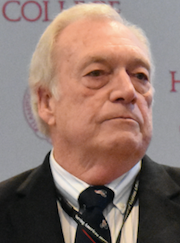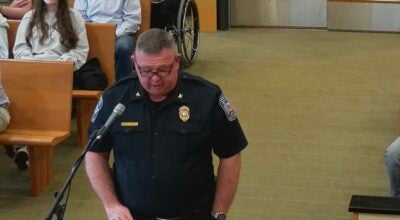Cohort to build housing plan
Published 3:00 am Wednesday, November 27, 2019
Prince Edward County, partnering with the Piedmont Health District (PHD), has been selected to participate in a nationwide action learning cohort to share ideas and strategies for affordable housing and health equity in rural areas, a PHD press release noted.
The release continued by citing that PHD staff and PHD Health Director Dr. H. Robert Nash led the local team that applied for the program offered by the National Association of Counties and County Health Rankings & Roadmaps.
Nash told The Herald, “So what we’re trying to do is engage private business and government and a lot of our private, not-for-profit agencies to come together with a cohesive, targeted plan to find ways to really get investment opportunities into, No. 1, more housing, and No. 2, more affordable housing.”
Officials shared details in the release about the nature of Prince Edward County’s involvement, and in an interview with The Herald, Nash explained how Prince Edward’s contributions will also benefit the surrounding counties.
Officials stated in the release that an area housing coalition was formed with members of existing organizations and agencies, including Piedmont Habitat for Humanity, Piedmont Senior Resources Area Agency on Aging Inc., the Prince Edward County Board of Supervisors and STEPS Inc.
“In all honesty I have to give a lot of credit and a lot of compliments to STEPS and their organization,” Nash said. “They’ve done a mountain of work in assessing housing in our area, mainly in Prince Edward County, but also in the outlying counties in the seven-county district, which is Buckingham, Cumberland, Amelia, Nottoway, Prince Edward, Lunenburg and Charlotte counties. That’s a lot of data shooting really fast.”
He noted having a 48-page memo containing some of their data.
“Sharron (Harrup) over there at STEPS and Amy Beatson have really done a tremendous job on that,” he said. “Amy is on this cohort with us for this nationwide study.”
Beatson, STEPS vice president of planning and evaluation, shared, on behalf of STEPS, what the action learning cohort could do to benefit the area.
“It’s an opportunity for us to learn from 12 other localities, rural localities, on how they’re addressing housing issues, availability or lack of availability of housing stock in the area, and it’s just bringing to us information on the link between housing and health and how that’s very relevant,” she said. “Housing is a big part of good health — having safe and stable housing.”
Helping explain what Beatson was referring to when she mentioned 12 other localities, the PHD press release noted that Prince Edward was one of 13 counties selected for the cohort. Also participating are Blair County, Pennsylvania; Carbon County, Utah; Lancaster County, South Carolina; McCracken County, Kentucky; Mono County, California; Palm Beach County, Florida; Perry and Athens counties, Ohio; Renville County, Minnesota; Rice County, Minnesota; Saratoga County, New York; and Swift County, Minnesota.
“We are also going to learn toolkits and resources that other communities have used in order to look at housing issues and to address those issues in their communities,” Beatson said. “We’ve had several sessions with the group so far, and I think we’re going to have some great takeaways.”
The PHD release cited that counties participating in the cohort have created a team of three to five individuals ranging from public health directors, housing directors, judges and elected officials that will join as a community of learners in a structured format to learn, collaborate and network to understand the link between housing, health and equity.
In addition to Nash and Beatson, the other members of Prince Edward’s team include Farmville 801 District Supervisor Pattie Cooper-Jones, Piedmont Habitat for Humanity Executive Director Jayne Johnson and Piedmont Senior Resources Director of Nutrition and Transportation Jordan Miles, who was recently elected as the Maysville District supervisor in Buckingham County.
“With that very small group of representatives in the community, we’re structuring our strategy to address affordable, healthy housing, because healthy housing affects public safety and public health — it’s just a logical follow-through,” Nash said. “Housing in our area is hard to come by, and what is available is extremely expensive because of the marketplace being moved by the universities.
“So we have some target issues that we want to pull in a lot of independent, private business people, along with our elected government officials, and there are a lot of good ideas out there through the Robert Wood Johnson Foundation doing really tremendous work in housing throughout — it’s a cliché, but it’s — rural America, and there isn’t just one rural America,” Nash continued.
Nash noted that the Virginia Department of Health’s new commissioner, Dr. M. Norman Oliver, is keenly involved in matters of population health and equity.
“And equity in housing and education and access to health, they’re all interrelated in this big circle that influences our community population health,” Nash said.
“It’s very difficult to get from Nowhere, Lunenburg, to Centra Southside Community Hospital,” Nash added. “It takes a long time, and that’s a lot of distance at three in the morning.”
Nash described learning some alarming information at the cohort’s nationwide teleconference Thursday, Nov 21.
“You wouldn’t believe — and it wasn’t just Virginia, it was the whole country — the spectrum of localities that have housing costs exceeding 50% of the population’s income, per capita,” he said. “It’s like, wow, are you kidding me? Because I had no idea. I’m the rookie of the team here.”
Last year, Centra Health and the Virginia Department of Health jointly did a community health needs assessment, Nash cited.
“We were mandated to do this every five years by Congress,” he said. “And five years ago and again this past year, housing was the No. 3 priority throughout the entire district — that’s all seven counties. Since neither Centra nor the health department are really in the housing business, there are a lot of avenues that we can create to bring the message to the decision-makers and the power players in our community to take positive steps on this issue. And that’s what we’re all about.”
Miles explained Piedmont Senior Resources’ interest in what he described as a “really innovative cohort.”
“We’ve been looking at regional statistics for a while in terms of what the age wave is going to do to our public service programs, whether it be health care, whether it be social services, whether it be our services, because by 2030, the (number) of Americans 65 years and older is going to more than double,” he said. “And for the first time, those aged 65 and older will outnumber those who are 18 and under, and so it’s going to have a dramatic and a severe impact on the way social services and assistance agencies, like Piedmont Senior Resources, do business, especially with respect to those who only deal with the aging community.
Johnson, speaking on behalf of Piedmont Habitat for Humanity, said, “I think that because each of the people so far involved in the cohort, the committee, we all represent different areas and populations in the county, and we need to work together. Housing and health are really important issues, and oftentimes one affects the other … In addition, the people that have health issues sometimes are prevented — whether it’s financial or abilities — to be able to obtain or live in quality homes. And when I say ‘quality,’ I mean safe, decent, affordable homes.
Cooper-Jones said she thinks the cohort “can benefit a lot of people, because I believe there’s a housing shortage for all walks of life, and I think if we could truly get this thing on the ground and running that it could bring affordable housing to all walks of life inside of Prince Edward County.”
The PHD release cited that the 2019-20 Rural Impact County Challenge Action Learning Cohort kicked off Sept. 26 and runs through Aug. 2020, during which time the local team will meet regularly.
“We have organizational and strategy meetings either here at the district health department offices or down at Jayne’s in her administrative offices for Habitat for Humanity just to try to correlate all of our ideas,” Nash said. “And then we meet monthly as a group with these nationwide teleconferences. … And they will continue through June or July of 2020, and by that time, we will have pretty much our marching plans very well organized and have our presentation skills honed out so we can elicit some support for this.”





